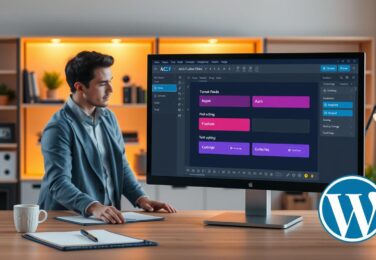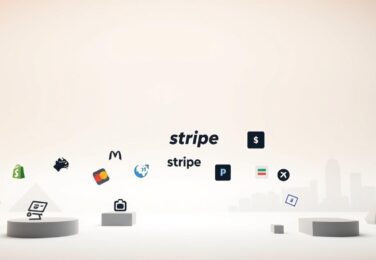Build your website using your own theme

Table of Content
Every digital journey starts with a dream of creating something uniquely yours. We’ve all been there, looking at generic website templates, wanting something that shows our brand’s true personality. The WordPress Gutenberg Builder has changed how we build websites, giving us more creative freedom than ever before.
Creating a custom WordPress theme is more than just about looks. It’s about making a digital experience that really talks to your audience. Our WordPress page builder tools have made web design easier for entrepreneurs and creatives in Australia to turn their digital dreams into reality.
If you’re a small business owner in Melbourne or a startup founder in Sydney, your website should be as unique as your brand. With WordPress website building techniques, we can now create platforms that are not just useful, but unforgettable.
Key Takeaways
- Custom themes offer unparalleled brand representation
- WordPress Gutenberg Builder simplifies complex design processes
- Responsive design is crucial for modern websites
- Personal branding starts with a distinctive online presence
- Web design tools are now more accessible than ever
Getting Started with WordPress Theme Development
Starting with WordPress theme development opens a world of creative possibilities. It’s a journey from novice to expert in WordPress website customisation. You’ll learn essential tools and techniques.
Essential Tools for Theme Creation
To start your WordPress content editor journey, you need the right tools. Here are the must-haves:
- Code editor (Visual Studio Code or Sublime Text)
- Local development environment (XAMPP or MAMP)
- Browser developer tools
- Git version control system
Setting Up Your Development Environment
For a smooth WordPress website customisation workflow, set up your development environment well. Install a local server that matches your live hosting environment.
| Tool | Purpose | Recommended Options |
|---|---|---|
| Local Server | Create WordPress testing environment | Local by Flywheel, XAMPP |
| Code Editor | Write and edit theme files | Visual Studio Code, Atom |
| Version Control | Track code changes | Git, GitHub Desktop |
Understanding WordPress File Structure
Knowing the WordPress file structure is key for theme development. Each part has a role in making a theme work well.
“Know your WordPress file structure like the back of your hand, and you’ll build themes with confidence and precision.”
Important directories include:
- wp-content/themes/ – Where custom themes live
- wp-content/plugins/ – For extra functionality
- wp-includes/ – Core WordPress functions
Understanding these basics will prepare you to start your WordPress theme development journey.
The Power of WordPress Gutenberg Builder
The WordPress visual editor has changed how we make websites. Gutenberg blocks make designing websites easier and more fun. They help solve complex layout problems with ease.
Gutenberg blocks let us design content in a new way. We can drag and drop elements without using complicated HTML. This makes creating dynamic pages easy for everyone.
- Rich multimedia integration
- Seamless responsive design
- Customisable content structures
- Enhanced visual editing capabilities
“Gutenberg represents a quantum leap in WordPress content creation” – Matt Mullenweg, WordPress Founder
The main benefits of Gutenberg blocks are:
| Feature | Benefit |
|---|---|
| Block Patterns | Pre-designed layout combinations |
| Reusable Blocks | Save and repeat complex content structures |
| Advanced Styling | Inline design modifications |
Now, our WordPress visual editor gives us more control than ever. Web design is more fun and accessible for everyone.
Designing Your Theme’s Core Framework
Creating a stunning WordPress layout design needs careful planning. We start by understanding the key elements that turn a simple template into a professional site.
Building a strong theme framework includes important parts for both looks and function.
Constructing Header and Footer Templates
The header and footer are your website’s digital bookends. They show your brand and help users navigate. When making these templates, think about:
- Consistent branding elements
- Clear navigation menus
- Responsive logo placement
- Contact information integration
Responsive Design Principles
In today’s mobile world, making your website responsive is key. We suggest:
- Flexible grid layouts
- Percentage-based sizing
- Creating media query breakpoints
- Testing on different devices
CSS Styling Strategies
Good WordPress design comes from smart CSS use. Our strategy includes:
- Clean, semantic class naming
- Modular stylesheet architecture
- Styling for the best performance
“Great design is actually a lot harder to notice than poor design. Good design is actually invisible.” – Jared Spool
Mastering these core elements helps you make WordPress themes that look great and work well.
Integrating Custom Post Types and Taxonomies
Building a WordPress website means understanding custom post types and taxonomies. These tools help us organise and show content better. They make WordPress website building more structured.
Custom post types go beyond the usual blog posts and pages. They let creators make unique content structures. This means more flexibility in showing information for WordPress content creation.
- Create specialised content categories
- Develop specific content templates
- Enhance website navigation
- Improve content management
“Custom post types are like Swiss Army knives for WordPress website building – versatile and incredibly useful.”
Now, let’s see how custom taxonomies add to post types. They offer more ways to categorise content:
| Post Type | Custom Taxonomy | Purpose |
|---|---|---|
| Portfolio | Project Type | Categorise professional work |
| Recipe | Cuisine | Organise culinary content |
| Product | Brand | Group merchandise |
Using these advanced WordPress content creation methods, we can make websites more intuitive and user-friendly. They can really stand out online.
Mastering WordPress Content Editor Features
The WordPress content editor has changed how we make and manage digital content. Now, with the WordPress Gutenberg Builder, creating engaging web experiences is easier than ever.
Creating great content starts with knowing the WordPress content editor’s key features. Let’s look at some strategies to improve your digital content.
Working with Block Patterns
Block patterns make designing content easier. We can:
- Insert pre-made content layouts fast
- Keep designs consistent on all pages
- Save time on manual formatting
- Customise patterns to fit our brand
Creating Custom Block Templates
The WordPress Gutenberg Builder lets us make unique block templates. These templates help us:
- Create content that fits our style
- Make content creation quicker
- Keep designs consistent
- Improve how users experience our content
Optimising Content Layout Options
Optimising content layout is key for engaging digital experiences. With the WordPress content editor, we can:
- Use responsive design elements
- Make content blocks look good
- Ensure smooth experiences on all devices
“The future of content creation lies in flexible, intuitive design tools.” – Web Design Experts
By getting good at these WordPress content editor features, we can change our digital content strategy. We can make online experiences more engaging.
Advanced Theme Customisation Techniques
Exploring WordPress website customisation needs a smart plan for layout design. We’ll show you advanced theme customisation techniques. These will help turn your WordPress site into a unique digital space.

Experienced developers say WordPress layout design is more than just changing templates. We’ll share expert tips to boost your website’s look and function.
- Create custom widget areas that enhance user interaction
- Implement dynamic theme options for greater flexibility
- Integrate third-party plugins seamlessly
- Develop responsive design elements
“Customisation is the key to standing out in the digital landscape”
Our suggested method includes picking the right plugins and integrating them wisely. We’ll help you choose the best tools to change your WordPress site.
| Customisation Technique | Difficulty Level | Impact |
|---|---|---|
| Custom Widget Areas | Intermediate | High |
| Theme Options Panel | Advanced | Very High |
| Plugin Integration | Beginner | Medium |
With these advanced WordPress website customisation techniques, you’ll make your site stand out. The aim is not just to look good but to make it easy and fun to use.
Implementing Drag and Drop Functionality
The WordPress drag and drop builder has changed website design. It makes creating content easier for developers and content creators. Gutenberg blocks offer a powerful tool for building engaging websites with little technical skill.
Web designers can now use advanced visual controls. These controls change the coding experience. The drag and drop feature lets users create unique digital experiences without needing to know how to code.
Building Custom Gutenberg Blocks
Creating custom Gutenberg blocks gives you more design freedom. Here’s what we suggest:
- Learn about block structure and how to register them
- Build libraries of reusable components
- Add advanced styling options
Creating Reusable Block Libraries
Reusable block libraries make website development faster. They offer consistent design elements on different pages. Developers can:
- Create standardised content modules
- Save time with pre-made block templates
- Keep the brand consistent
“The future of web design lies in simplicity and user-friendly interfaces” – WordPress Design Team
Enhancing User Experience with Visual Controls
Visual controls in the WordPress drag and drop builder change how we manage content. Our goal is to create easy-to-use interfaces. This reduces the learning curve and increases productivity for website creators.
By using responsive design with Gutenberg blocks, we can make websites that look great and work well.
Testing and Optimising Your Theme
Creating a WordPress page builder theme needs careful testing and optimisation. We’ll look at key strategies to make sure your theme works well on all platforms and for users.

Improving performance is a crucial step in building a WordPress site. We focus on several important areas:
- Browser compatibility checks
- Mobile responsiveness validation
- Speed performance measurements
- Code standard compliance
“Great WordPress themes aren’t built overnight – they’re carefully crafted and rigorously tested.”
For testing your WordPress page builder theme, we suggest using special diagnostic tools. These tools help find problems before you launch your site.
| Testing Category | Key Metrics | Recommended Tools |
|---|---|---|
| Performance | Load Time, Page Speed | Google PageSpeed Insights |
| Compatibility | Cross-Browser Functionality | BrowserStack |
| Responsive Design | Mobile Rendering | Chrome DevTools |
Our testing method makes sure your WordPress project meets high standards. Pay close attention to detail during optimisation to avoid future problems.
Always check your theme against WordPress coding standards and do thorough user experience testing. This detailed approach ensures a strong, fast WordPress page builder theme that gives great results.
Conclusion
We’ve looked at how WordPress Gutenberg Builder and website customisation can change the game. This guide showed us how powerful and flexible web design can be. It all comes down to knowing the right techniques and tools.
Building a custom WordPress theme is more than just making it look good. It’s about creating an online space that shows off your brand’s unique style. The WordPress Gutenberg Builder makes it easy to build websites that are both beautiful and functional, even if you don’t know how to code.
We’ve covered everything from making a basic theme to advanced customisation tricks. Whether you run a small business or are a pro web designer, the skills we’ve talked about can help you make amazing websites. These websites will grab your visitors’ attention and keep them coming back.
Are you ready to take your WordPress website to the next level? The team at Defyn Digital is here to help Australian businesses shine online. We’re experts in WordPress development and can help you use these advanced design tips. Contact us at hello@defyn.com.au and let’s make your digital presence stand out.










